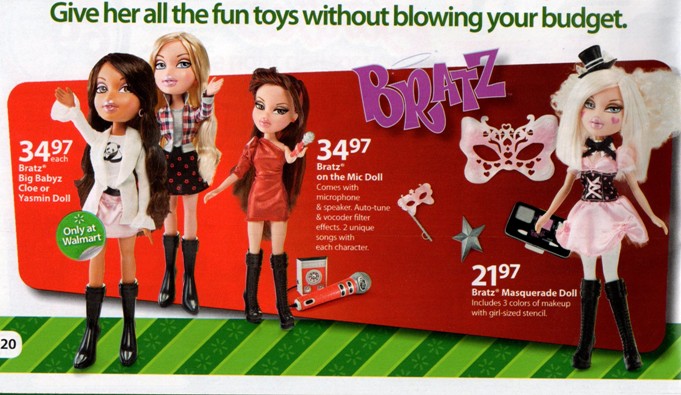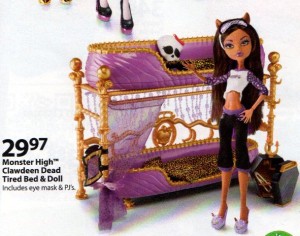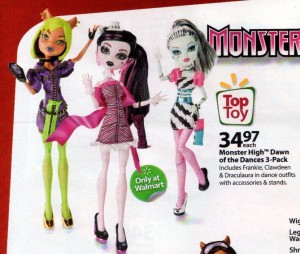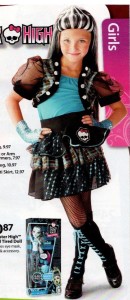In my childhood, I looked forward to November for three reasons: birthdays (mine, my mom’s and my grandma’s), Thanksgiving dinner and the arrival — via our mailbox and newspapers — of toy catalogs, which I’d use to make my Christmas list.
So this morning, when I stumbled upon a toy catalog in the newspaper, I had to have a look, for old times’ sake. I didn’t figure I’d find the Play-Doh and crayons and board games of yore. But I have one word in response to what I did find, like Bratz and Monster High dolls (the latter of which I had never heard of). That one word is this:
Really?
Of all the things one could buy for kids to play with, “the fun toys” — according to the ad — are the ones in short skirts, tight shirts and pairs of fishnet stockings (which they wear on their anatomically impossible legs).
The “fun toys” are these:
And these:
And if you like how fishnets look on your daughter’s doll, you can also buy them for your daughter:
We wonder why, when a four year old girl is asked what she wants most in the world, it’s to look like Hannah Montana (1). We wonder why little girls look (and act) like teenagers, why teenagers look (and act) like adults. But then, when the impact of dolls dressed like the ones in this ad is questioned, parents say, “Please… every girl plays with this stuff. It’s what they like!”
And why is that?
“When you don’t think critically about what is being consumed, you will throw up your hands and say ‘this is what everybody wears!’ (or ‘this is what every kid plays with!’),” said my human sexuality professor — Dr. Dae Sheridan (2) — in a class over the summer. “You won’t realize this is an industry designed to take your money … you can change the demand.”
She added, “We’re pushing our children into these little boxes based on what’s available to purchase. Be a savvy consumer. Think about Bratz dolls. They have large lips and boobs, tiny waists (and are) dressed in fishnets and belly shirts … Parents say ‘this is just what kids wear’ (and ‘this is just what kids play with’) but it wouldn’t be … if parents stood up and (stopped buying it). We have to question it.”
PREACH.
– – – –





